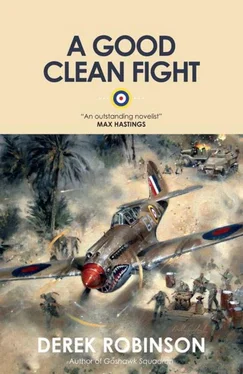“Glad you enjoy it,” said a lieutenant-general called Saxon. “Just remember you wouldn’t be sitting here at all if the British Army hadn’t stopped Graziani’s attack in 1940.”
“Ping!” Lester said. “Wavell counter-attacks, gains a thousand miles. Pong! Rommel arrives, the British lose it all. Ping! Auchinleck attacks, he gains a thousand miles. Pong! Rommel attacks and wins half of it back. Ping! Did I forget anyone?”
“Only a few dead men,” said a brigadier named Munroe. “A few hundred thousand, that is, counting both sides. Pity they’re not here to argue with you, isn’t it?”
He was next to a lanky, gray-haired Reuters man, Shapiro. Shapiro said: “Somehow it seems worse, out in the desert. I mean, you look at the bodies and you think: They died for what? For that ? That sand?” He shrugged.
“Casualty figures don’t matter any more,” said Saxon. “Not since the last war.”
“You can’t mean that,” Lester said. “Tell me you don’t really mean that.” Saxon shrugged.
“Arrows on maps,” Shapiro said. “Joe Public opens his newspaper and he sees arrows on maps, and he thinks, ‘Hey, that’s the same as this time last year. And the year before. What’s goin’ on out there?’”
“An extremely difficult war,” Munroe said. “That’s what’s going on.”
“Which you make more difficult for yourselves by keeping everything so damned secret,” Lester said. “I talked to more generals and admirals and air marshals in Poland and in France than I’ve ever seen here.”
“Poland and France fell rather quickly,” Saxon said. “As I recall.”
“Yes, but Henry’s got a point,” Shapiro said. “You’re never going to win here unless you get big reinforcements. You’re fighting Rommel and you’re also fighting London and Washington. You’ve got to get your Western Desert back on the front page.”
“They’ve had victories here,” Mrs. Lester said. She was sick of the subject.
“We have indeed,” Munroe said. “We’ve won plenty of tank battles, for instance.”
“See one burning tank, you’ve seen ’em all,” Lester said.
“I’ve seen fifty burning tanks. Theirs, not ours.”
“Me too,” Shapiro said. “I took pictures but they were no good. All smoke. Black on black.”
“That’s a frightful shame,” Saxon said, “but we don’t actually destroy the enemy in order to make attractive illustrations for the world’s press. If you had been in Sidi Barrani when we took it, you would have seen…” He paused. “Well, perhaps it’s better not to pursue that theme at the dinner table. Suffice it to say that the scenes were unforgettable.”
“I believe you,” Lester said. “The trouble is, Sidi Barrani has changed hands so often, it’s a joke.” Saxon drank his coffee and studied the dregs. “You think I’m being unfair, don’t you?” Lester said. “The fact is, people in England make jokes about Sidi Barrani. And it’s even worse in Chicago. In Chicago they think Sidi Barrani’s one of the chorus in The Desert Song.”
“That’s certainly box-office,” Mrs. Lester said. “I saw it three times.”
“Well, I don’t know,” Munroe said. “You don’t want tank battles and you don’t want Sidi Barrani. What do you want?”
“First choice?” Shapiro said. “A storming advance, a massive victory, and no ping-pong.”
“That may take a little time to arrange,” Saxon said. “Second choice?”
“Action!” Lester said. “Gung-ho slam-bang excitement. Hollywood’s making a monkey out of the Nazis, it’s easy, Errol Flynn does it every week. Why can’t you?”
“Because it’s not the same as victory,” Munroe said comfortably.
“No,” Shapiro agreed, “but it’ll do until victory, comes along.”
“Otherwise the public is really going to lose interest,” Lester said.
“You know, there are other wars,” Saxon told him. “You’re not obliged to stay here. Go to Russia. Go to the Pacific. Go to China.”
“I did. I spent two years covering China. Lousy war. Did you know the Chinese have twenty-six ways of spelling dysentery?”
Saxon said: “Is your husband always as dissatisfied as this, Mrs. Lester?”
“Henry was born miserable. He came down the birth canal shouting for Customer Complaints.”
“They were closed,” Lester said. “Typical incompetence. I couldn’t even reach my lawyer! Can you believe it? Half-past four in the morning, here I am, stark naked and held against my will in this squalid hospital, and my lawyer doesn’t answer his phone!”
“Nothing went right after that,” his wife said. “Nothing.” The others smiled. She didn’t. It wasn’t funny to her any more. “Dance with me, Sydney,” she said appealingly to Shapiro, “or I’ll have the Mafia break both your legs.”
“Well, if you’re going to use flattery…” he said, and led her to the dance floor.
* * *
The patrol got four days’ leave.
All of them spent a lot of it in water. They had dreamed and daydreamed about water all the time they were in the desert: rivers, streams, cloudbursts, running taps, blue-green swimming pools ten feet deep. Fire hoses spouting. Spring showers. Mountain lakes. The spray from watering-cans. Melting ice. There were countless ways to dream about water when the temperature was a hundred and twenty, when the ration was eight pints per day and you felt you were sweating nine pints an hour. During their leave in Cairo the members of the patrol caught up on their fantasies and wallowed in the stuff.
After that, they ate and drank. Rommel’s Afrika Armee was waiting beyond the border, but Egypt was technically neutral and there was no rationing in Cairo. The patrol gorged itself on fresh fruit: melons and pomegranates, peaches and grapes, oranges and figs, cherries and pears and plums. Not dates. They’d seen enough of dates. Above all, they ate ice cream. There were places in Cairo that sold ice cream that was such a silky, swift-melting masterpiece of chilled flavor that even the passing thought of it in the depths of the Sahara made a man salivate. The patrol ate a lot of ice cream. Also many plates of egg and chips. Forget Harris. You couldn’t beat egg and chips.
At night they drank. The officers drank, in the main, gin and tonic; the other ranks drank beer. Most got drunk but none got dangerously drunk. The worst thing that could happen to a soldier in the SAS was to be kicked out: “returned to unit,” as the official phrase had it. Nobody got drunk enough to risk that.
Sex—which, in the desert, quickly receded in the face of such heavy competition as survival and combat—emerged again in Cairo as a major preoccupation. However, very few of them took a chance on the prostitutes who were making a killing out of the war. This had little to do with any high moral tone in the SAS but a lot to do with avoiding being returned to unit. Those with an irresistible itch for sex simply scratched it and then went for another swim, another dish of ice cream, another plate of egg and chips.
Captain Lampard—unlike many of his fellow-officers—did not rent a flat or a house in Cairo; he preferred to live in his tent in the SAS camp just outside the city. He spent the first morning of his leave writing a report of the raid on Barce and subsequent events. He left it with the adjutant’s office to be typed up, took a shower, changed into a fresh lightweight uniform, signed out a jeep, and set off to call on some old chums in a part of British Army Headquarters known as Department SU. Here they had the safe if mournful task of recording the names of those who had fallen in battle, or laid down their lives, or made the supreme sacrifice, or even—modern war being a mechanical and impersonal affair—been killed. Someone with an eye for symbolism had brought back from Benghazi an Italian road sign which said SENSO UNICO, meaning one-way street, and stuck it on the department’s door. It soon got taken down, but the name stuck. Lampard was heading for Department SU.
Читать дальше












